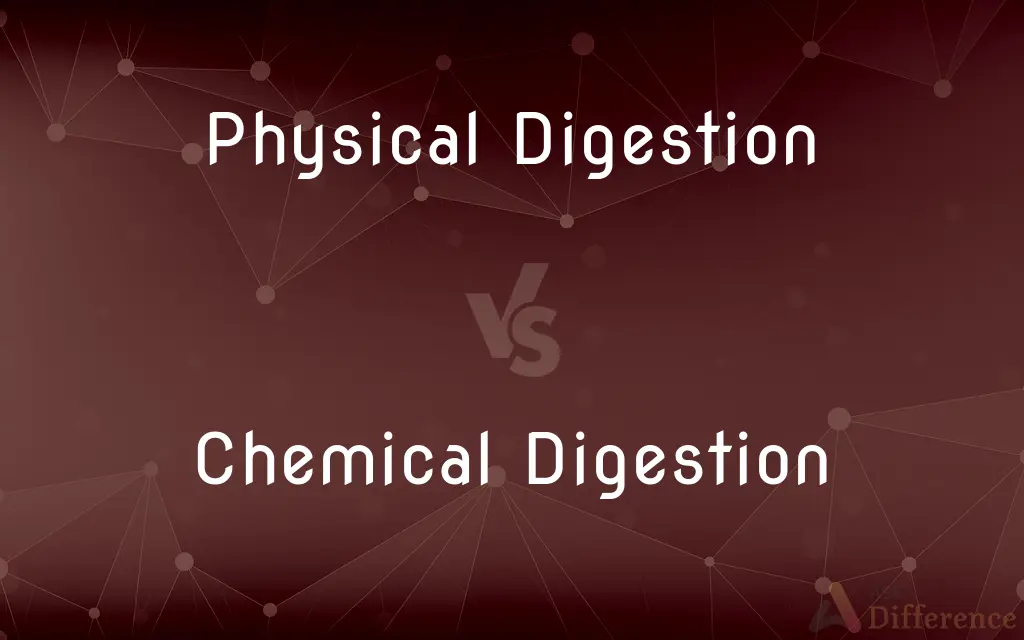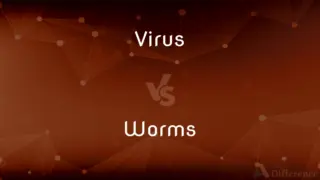Physical Digestion vs. Chemical Digestion — What's the Difference?
By Tayyaba Rehman — Published on January 4, 2024
Physical Digestion involves the mechanical breakdown of food into smaller pieces, while Chemical Digestion involves breaking down food into simpler nutrients through chemical reactions, primarily enzymes.

Difference Between Physical Digestion and Chemical Digestion
Table of Contents
ADVERTISEMENT
Key Differences
Physical Digestion: Physical breaking down of food into smaller particles, like chewing in the mouth. Chemical Digestion: Involves enzymes and other digestive chemicals to break down food into nutrients.
Physical Digestion: Primarily occurs in the mouth and stomach (chewing and churning). Chemical Digestion: Happens throughout the digestive system, notably in the stomach and small intestine.
Physical Digestion: Increases the surface area of food for enzymes to act upon. Chemical Digestion: Breaks down complex molecules like proteins, fats, and carbohydrates into simpler forms.
Physical Digestion: Results in physically smaller, yet chemically unchanged, food particles. Chemical Digestion: Produces simpler molecules like amino acids, fatty acids, and simple sugars.
Physical Digestion: A mechanical process not involving chemical change. Chemical Digestion: A biochemical process involving enzymes and other digestive secretions.
ADVERTISEMENT
Comparison Chart
Process
Mechanical breakdown of food
Chemical breakdown of food
Location
Mouth and stomach
Throughout digestive tract
Role
Increases surface area for enzyme action
Breaks down complex molecules
End Products
Smaller food particles
Nutrients like amino acids, simple sugars
Nature
Mechanical
Biochemical, involving enzymes
Compare with Definitions
Physical Digestion
Breaking food into smaller pieces by mechanical means.
Chewing is an essential part of physical digestion.
Chemical Digestion
Breaks down complex molecules like proteins and carbohydrates.
Proteins are broken into amino acids during chemical digestion.
Physical Digestion
Increases food's surface area for chemical digestion.
Physical digestion in the mouth prepares food for enzymatic breakdown.
Chemical Digestion
Converts food into absorbable forms.
Chemical digestion turns starch into simple sugars for absorption.
Physical Digestion
Involves the mechanical actions of teeth and muscles.
The stomach's churning is a physical digestion process.
Chemical Digestion
Involves digestive enzymes and acids.
The stomach's gastric acid is crucial for chemical digestion.
Physical Digestion
Does not alter the chemical composition of food.
Physical digestion involves breaking down, not chemically changing, food.
Chemical Digestion
The enzymatic breakdown of food into nutrients.
Saliva starts chemical digestion in the mouth.
Physical Digestion
A precursor to chemical digestion in the digestive process.
Effective physical digestion aids the efficiency of subsequent chemical digestion.
Chemical Digestion
Occurs throughout the digestive tract.
Most chemical digestion happens in the small intestine.
Common Curiosities
What initiates chemical digestion in the human body?
Saliva in the mouth, containing enzymes like amylase, initiates chemical digestion.
How does physical digestion aid in nutrient absorption?
By breaking food into smaller pieces, physical digestion increases the efficiency of nutrient absorption during chemical digestion.
What are the primary enzymes involved in chemical digestion?
Amylase, protease, and lipase are key enzymes in chemical digestion.
Can the digestive process function without physical digestion?
While possible, efficient digestion typically requires both physical and chemical digestion.
How is chemical digestion regulated in the body?
Hormones and nervous system signals regulate the release of digestive enzymes and acids.
Is stomach acid part of physical or chemical digestion?
Stomach acid is part of chemical digestion, breaking down complex molecules.
Are dietary fibers affected by chemical digestion?
Most dietary fibers resist chemical digestion and pass through the digestive tract.
Can physical digestion alone break down fats?
Fats primarily require chemical digestion, as physical digestion alone is insufficient for their breakdown.
What role does the stomach play in physical digestion?
The stomach churns food, mechanically breaking it down further after chewing.
What happens if physical digestion is inadequate?
Inadequate physical digestion can lead to less effective chemical digestion and nutrient absorption.
Is water absorbed during chemical digestion?
Water absorption mainly occurs in the large intestine, after most chemical digestion is complete.
Do all foods undergo both physical and chemical digestion?
Most foods undergo both processes, but some like certain fibers may only undergo physical digestion.
What role do bile salts play in digestion?
Bile salts, produced by the liver, aid in the emulsification and chemical digestion of fats.
How does the body absorb nutrients after chemical digestion?
Nutrients are absorbed through the intestinal walls into the bloodstream after chemical digestion.
How does aging affect physical and chemical digestion?
Aging can reduce the efficiency of both physical and chemical digestion due to factors like reduced saliva production and slower metabolic processes.
Share Your Discovery

Previous Comparison
Unit Testing vs. System Testing
Next Comparison
Virus vs. WormsAuthor Spotlight
Written by
Tayyaba RehmanTayyaba Rehman is a distinguished writer, currently serving as a primary contributor to askdifference.com. As a researcher in semantics and etymology, Tayyaba's passion for the complexity of languages and their distinctions has found a perfect home on the platform. Tayyaba delves into the intricacies of language, distinguishing between commonly confused words and phrases, thereby providing clarity for readers worldwide.
















































